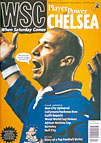 Robbie James passed away last month. Huw Richards pays tribute to the man that starred for Swansea
Robbie James passed away last month. Huw Richards pays tribute to the man that starred for Swansea
In football, sudden death isn’t supposed to mean anything much more serious than cup-ties. But the death at 40 of Robbie James reminds Swansea fans for the third time in 20 years of what it really means.
In 1978 Harry Griffiths collapsed and died in the treatment room at the Vetch Field four days before the team he built, and passed on to John Toshack,won promotion from the Fourth Division. Six years ago Wales midfielder Alan Davies, his career in decline, committed suicide. Davies had rejoined Swansea from Bradford City in an exchange deal a couple of years earlier. The player who went the other way, leaving for the second and last time, was Robbie James.
It was typical of Robbie, who died playing in the Welsh League for Llanelli, that he should still have been playing meaningful football at the age of 40. He had been doing so for a quarter of a century, since breaking into Swansea’s reserve side at the age of 15.
The statistics of his career speak of endurance, consistency and quality. His total of 782 league games is fourth on the all-time list behind Peter Shilton, Tommy Hutchison (another Swan) and Terry Paine. He was the youngest player to reach the landmarks of 100 and 200 league appearances. He won 47 caps in a period when Wales threatened to qualify for major competitions. He played nearly 300 League games for clubs other than Swansea – successively Stoke, QPR, Leicester, Bradford City and Cardiff City.
But Swansea will undoubtedly remember him longest and most fondly.
Records of 484 appearances and 115 goals – third and second respectively on the club’s all-time lists, only go part of the way to explain how much he meant. The greatest compliment a Welsh sportsman can receive is to be known, and be immediately recognised, by Christian name alone. Refer to “Robbie” among Swans fans at any time in the last 20-odd years and no further explanation was needed.
More than any other player, more perhaps even than John Toshack, Robbie personified Swansea’s years of miracle and wonder in the late Seventies and early Eighties. He was in the team when defeat at Rochdale forced a re-election application on 26th April 1975 – and still there on October 17th 1981, when victory at Stoke took them to the top of the League. And he had played 250 of the 277 matches in between. The record one fears he will hold in perpetuity is the most First Division games for Swansea – 82 out of a possible 84.
The Swans of the time would have been fun to watch even if they hadn’t been winning. So was Robbie. They scored spectacular goals – part of their eventual downfall would be that they didn’t get enough of the sort that squeeze in from three yards off somebody’s knee. Robbie could hit a ball with incredible power from the start. His first league goal, on New Year’s Day 1974 (when he was 16), rocketed past the Rotherham keeper from 30 yards and a high proportion of the subsequent 114 were comparable in distance and power.
They also tended to come in bursts – five in the first four matches created the momentum for a second successive promotion campaign in 1978-9, while four in four, including two to beat Aston Villa, took the Swans back to the top of the League in December 1981. Not that his direction was invariably impeccable. Swansea wingers – and spectators close to the touchline – learnt to fear the angled pass hit with such po-wer that Linford Christie might have struggled to catch it.
Built like a classic rugby union centre – ruggedly powerful, barrel-chested and broad-shouldered – he was also surprisingly quick over the first five yards, and his ability to beat defenders to the by-line from a standing start produced numerous goals in the great years. Still more impressive was the ability in a single continuous move-ment to go down on one knee, win a clean but crunching tackle and move away. It was no fluke that when he lost his pace he became an effective defender.
John Toshack, whose clubs since have included Real Madrid and Deportivo La Coruña, said he’d have been happy to have Robbie in any of his teams. Terry Yorath reckoned him a likely member of an all-time Wales XI.
If Robbie was fun to watch, he also looked as though he was having fun – and no player is more eagerly relished than the one whose skills are supplemented by a sense of genuine enjoyment. Of all the heroes of the Toshack years, Robbie was the one who looked as though, denied the skills to play at the highest level, he would have been at home on the North Bank, loving the game as fan rather than practitioner. We were lucky to have him.
From WSC 134 April 1998. What was happening this month